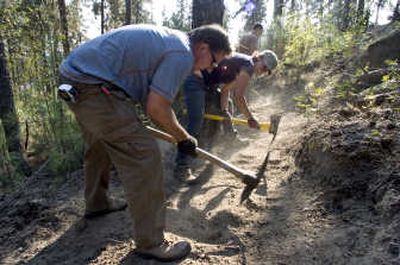Cyclists switch gears to fix trails

Organized mountain bike riders in Spokane are getting off their pedals and digging in to develop safe biking trails at one of the Spokane region’s most popular mountain bike destinations – Camp Sekani, about a mile upstream from Upriver Dam.
Last week, they held a training session at the 181-acre forest preserve to teach about 30 riders and land managers how to build bike trails that are sensitive to the environment and safe for riders of various skill levels. They used the term “sustainable” in describing their work.
It was part of a wider effort to develop a network of trails from the Spokane city-owned Camp Sekani on the north side of the Spokane River to Beacon Hill in the northwest.
The Fat Tire Trail Riders Club of Spokane sponsored the trail-building school last Saturday in cooperation with the International Mountain Bicycling Association.
For the event, the club turned to a “trail care crew” team, which was brought to Spokane through an outreach program of the Subaru automobile company.
“The idea is to teach people how to build sustainable trails,” said Kristin Butcher of the trail care crew.
For years, Camp Sekani has been popular for mountain biking, but many of the trails were not sanctioned by the city. Some of them included wooden bridge devices so riders could jump among the site’s rock outcroppings.
Mike Aho, outdoor program supervisor for the Spokane Parks and Recreation Department, said the most dangerous devices will be removed and the safer ones will be rebuilt.
Fat Tire club members got involved with the city about three years ago shortly after the club had been formed. The club applied to the Parks Department to adopt Camp Sekani about three years ago through the department’s “adopt-a-park” program.
Aho said the city wants to involve park users in developing safe facilities at Camp Sekani, and the Fat Tire club has shown a passion for riding and trail-building, something the city wants to encourage.
Saturday’s effort concentrated on building an area for riders with novice skills, including younger riders.
Most of the trails at Camp Sekani that were not sanctioned are geared toward advanced riders, but the trail-building experts said a good trail system should be usable by riders of all skill levels.
“Most of the riding up here is at a pretty high level,” said Dan Webber of the Fat Tire group.
Trails are needed for a “progression” of skill levels to draw in more riders, club members said.
Part of the trail-building effort is being funded through a $1,000 grant from the Kona Bicycle Co. Also involved is Mountain Gear of Spokane.
Aho said he also wants to create some separation between the trails and an old archery range that has fallen into disuse. He said he wants to revive the range.
Aho said Camp Sekani also is suited for cross country foot races, and he would like to bring such an event to the largely undeveloped forest property.
He said the initial trail-building effort could lead to creation of a mountain-biking area that would be comparable in significance to a proposed whitewater park on the Spokane River near downtown. As such, Camp Sekani could become a draw for mountain bikers from across the region.
“It will be an incredible asset in time,” Aho said.
Aho is working with the mountain bike groups to develop a trail map and master plan for Camp Sekani, which he hopes to submit to the Spokane Park Board in about a year.
No money is available now to develop the trails, and the system eventually could include a paved parking area and trailhead, he said.
But as the program develops, the Parks Department likely will publish maps of the trail system.
Aho, an avid outdoor enthusiast, said he has been riding his bike on the property for about 20 years. In those early years, Camp Sekani was beset by illegal dumping and motorcycle use, but those problems have been curbed in recent years by blocking motorized access and allowing mountain bikers to take more control of the property.
Aho said owners of private property adjacent to the city land also have been helping to stop the abuses.
Over the years, motorcycles created large scars in what Aho calls “gully washes,” but vegetation slowly has re-established itself in some spots.
Mike Brixey, a member of the Fat Tire club and Eastern Washington representative for the International Mountain Bicycling Association, said last week’s trail-building class was the fifth time that Subaru experts have come to Spokane to help develop trails. Three sessions have been held at Riverside State Park, and one session was held at Mount Spokane State Park, he said.
Representatives from two local ski areas were expected to attend Saturday’s class as part of the resorts’ efforts to develop biking trails.
Brixey said mountain bikers want to develop a master plan that includes property adjacent to Camp Sekani, including land owned by Spokane County and Avista.
The group has received technical assistance from the National Park Service’s program for river and trail conservation, he said.
The outdoor program of the Spokane Parks and Recreation Department began in 1991 and has grown to become one of the largest programs of its type in the country, according to a department news release. Activities cover a wide range of sports and include bicycle tours and classes throughout the region.